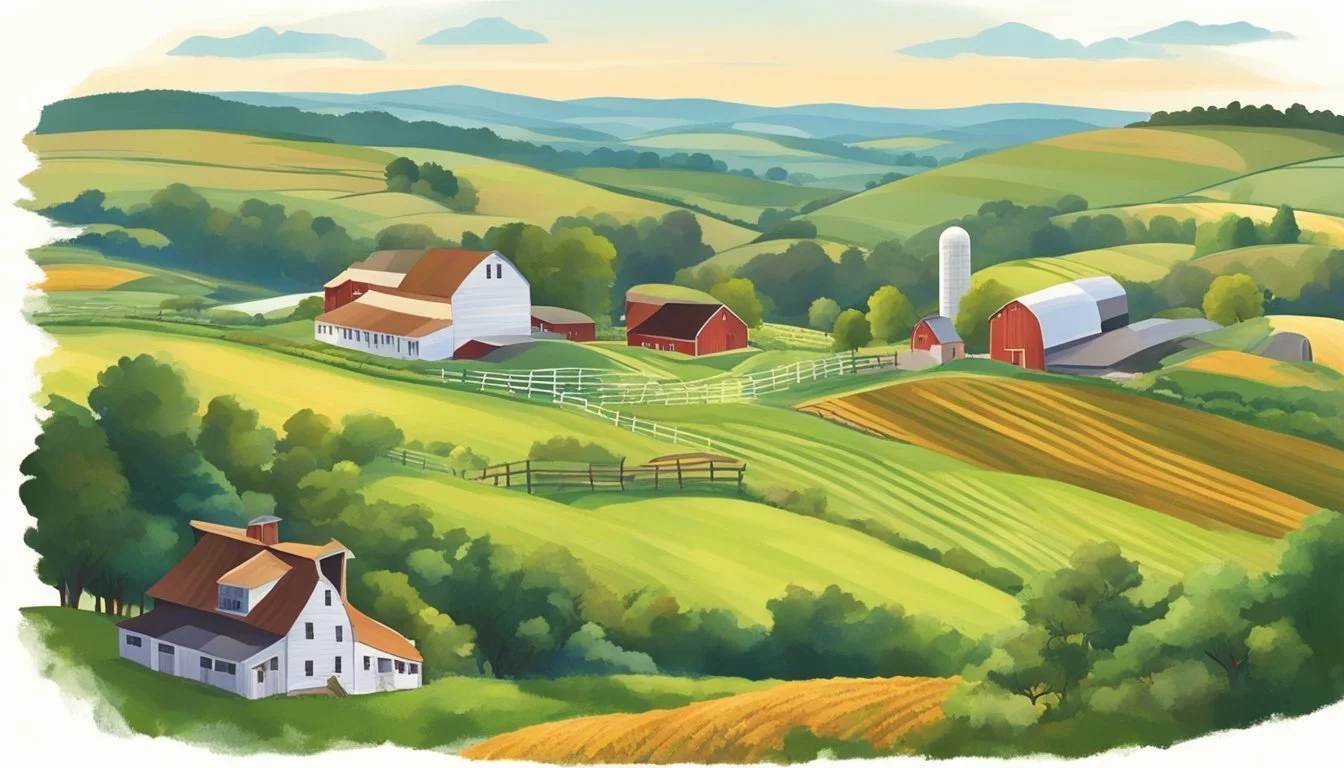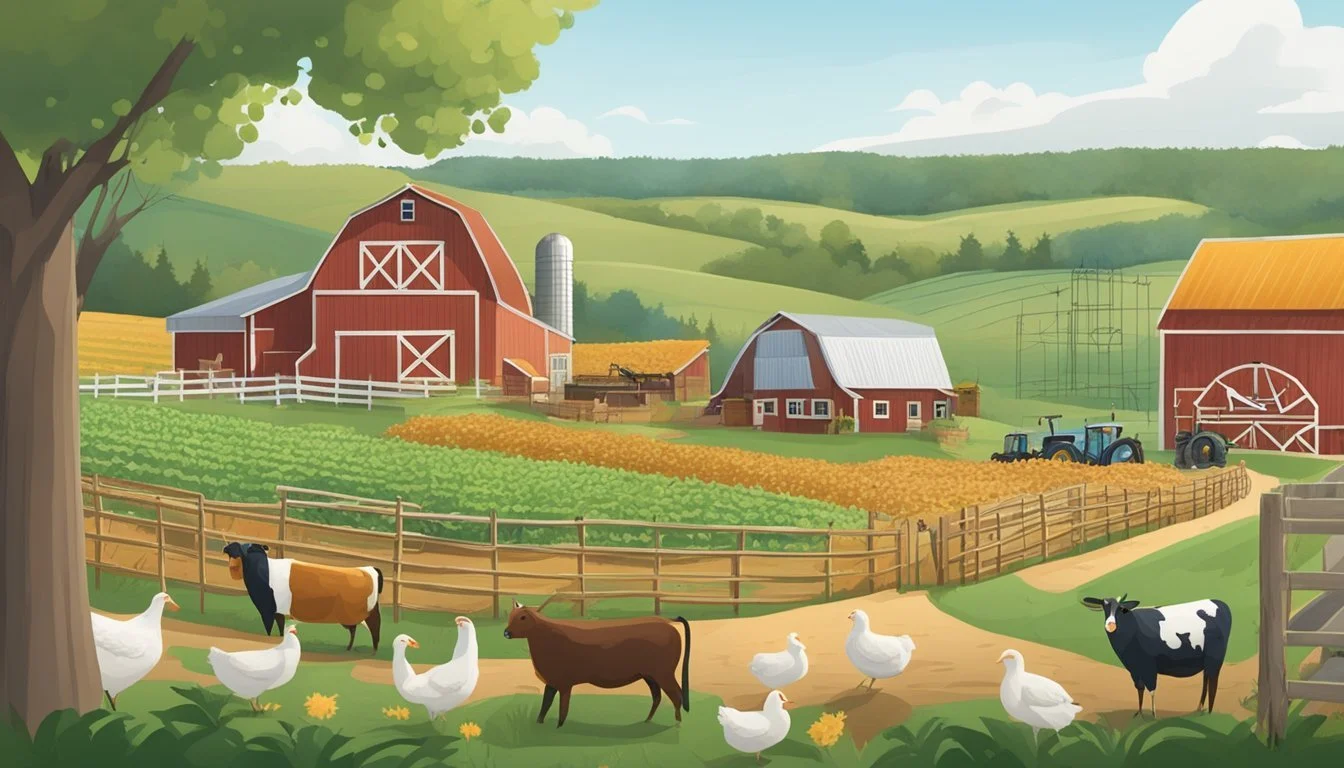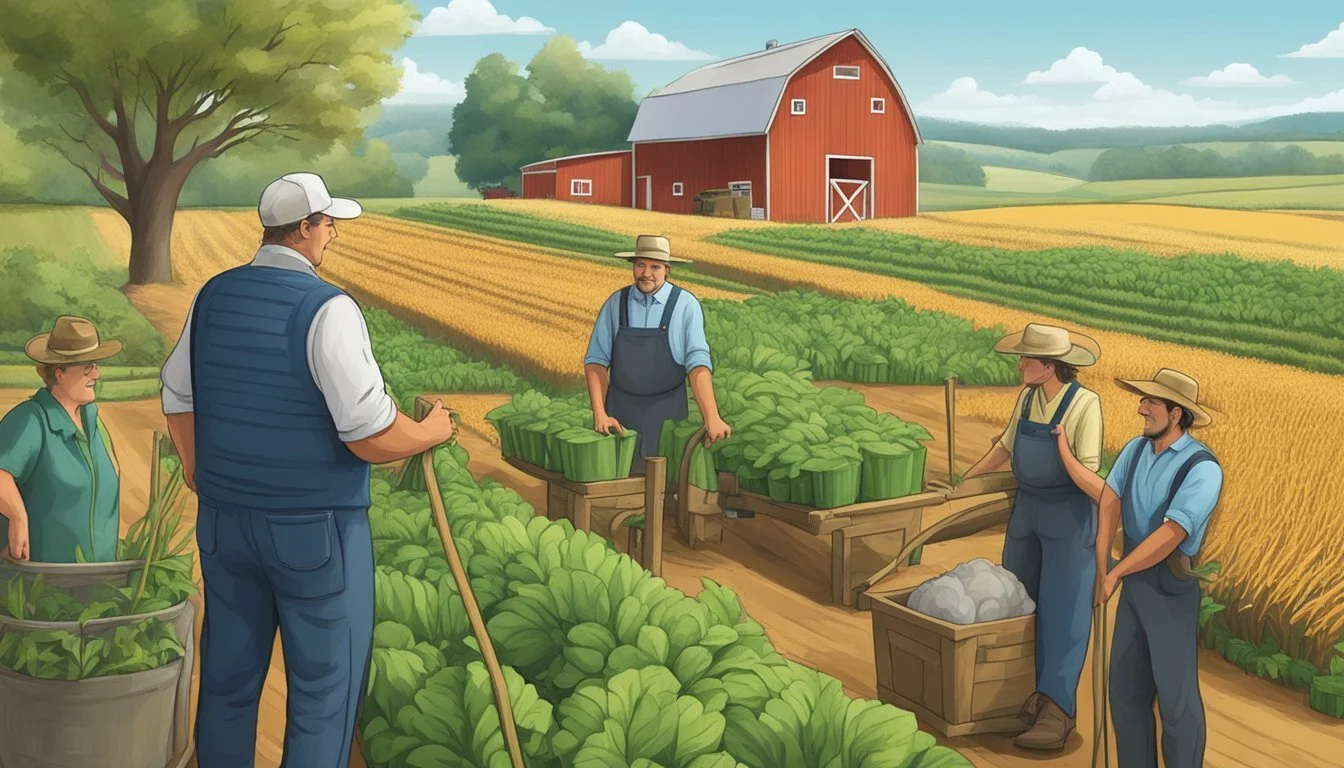Right to Farm Law in Pennsylvania
Understanding Agricultural Protections
The Right to Farm Law in Pennsylvania serves as a shield for agricultural operations, affirming the Commonwealth's commitment to preserving and advancing its agricultural land for food production and beyond. Enacted in 1982, Pennsylvania's Right to Farm Act acknowledges the importance of agriculture to the state's economy and heritage. By providing this protection, the law seeks to curb the conflicts that can arise when non-farming land uses extend into agricultural areas, particularly as it pertains to nuisance suits and restrictive ordinances.
Under this legislation, farming operations that adhere to appropriate management practices and are established prior to surrounding non-agricultural development are safeguarded against lawsuits that could arise from the ordinary nuisances of farming—such as noise, odors, or dust. The law effectively creates a legal buffer, allowing farmers to work without the looming threat of legal challenges that could disrupt or impede their operations. Furthermore, it specifies a statute of limitations, mandating that any lawsuit be filed within a set timeframe following the establishment or substantial change to a farming business.
As agricultural law continues to evolve in the United States, Pennsylvania's Right to Farm Act remains an essential component of the state's strategy to support and cultivate a resilient agricultural sector. It underpins the broader legal framework that aims to balance the interests of farming communities with those of urban expansion and environmental stewardship. This law exemplifies Pennsylvania's recognition of agriculture as both an economic necessity and a cultural cornerstone.
Historical Context of Right to Farm Laws
The inception of Right to Farm laws in the United States marks a critical legislative response to the tensions between agricultural operations and urban expansion. These laws are designed to protect the viability of farms, safeguarding a fundamental component for the survival of human society.
Early Adoption across States
Right to Farm laws initially surfaced as states recognized the need to shield farmers and their practices from urban encroachment and nuisance lawsuits. Such legislation varied state to state, with many adopting these laws in the latter half of the 20th century. The laws aim to support the agricultural industry by maintaining a stable environment under which farms can operate without undue pressure from non-farming neighbors and communities. This was seen as crucial for the survival of farmers whose livelihoods were increasingly under threat due to the expansion of urban areas and changing market conditions.
Evolution of Right to Farm in Pennsylvania
Pennsylvania's introduction of Right to Farm laws in 1982 was a strategic endeavor to protect its agricultural sector. The law intends to:
Shield Pennsylvania farms from unfounded nuisance lawsuits.
Conserve, protect, and promote agricultural land and production within the state.
Over time, these laws have experienced amendments to adapt to the evolving circumstances, such as changes in agricultural operations, as well as increased tensions between farming activity and residential areas. The legislature worked to reflect the changing dynamics between rural and urbanized areas while continuing to ensure the health and survival of agrarian communities. Despite intentions, Pennsylvania has still seen a reduction in the number of farm operations and farmland acres, illustrating the complexities involved in achieving a balance between protection and change.
Key Elements of the Pennsylvania Right to Farm Act
The Pennsylvania Right to Farm Act establishes clear legal protections to sustain agricultural operations, focusing heavily on nuisance lawsuit protections and ordinance shields.
Definition of Agricultural Operation
The Pennsylvania Right to Farm Act defines agricultural operations as diverse activities including the production, processing, and marketing of agricultural, aquacultural, horticultural, floricultural, viticultural, and dairy products. It also covers livestock and their products, ranch-raised fur-bearing animals, and their products, as well as products of poultry or bee raising, and forestry products.
Nuisance Lawsuit Protections
A fundamental component of the state law provides protection of agricultural operations from nuisance suits. Under this Act, agricultural operations that have lawfully been in operation for one year or more shall not be deemed a public or private nuisance due to altered conditions in or around the locality of the operation. This protection is a significant shield for farmers, ensuring that changes in land use or nearby developments do not place undue legal burdens on existing farming practices.
Ordinance Shield Provisions
The ordinance shield provisions in the Act limit the application of local ordinances on agricultural operations. These specific provisions dictate that ordinances cannot unreasonably restrict or regulate farm structures or farming practices if the agricultural operation is managed according to good agricultural practices as defined by state law. This part of the Act is designed to conserve and encourage development and improvement of the Commonwealth's agricultural land, thereby supporting farmers against restrictive local changes that could otherwise hinder farming activities.
Benefits and Criticisms
The Right to Farm Law in Pennsylvania aims to support the agricultural industry while balancing relationships with non-farming neighbors. This law has distinct benefits and criticisms from various stakeholders, reflecting its influence on food production and residential quality of life.
Support for Farmers and Food Production
Encouraging Agriculture Practices: The Right to Farm Law acts as a safeguard for farmers, enabling them to operate without the undue burden of frequent nuisance lawsuits. By protecting agricultural operations, farmers feel more confident to engage in essential food production, which can be inherently messy and odorous. This law is instrumental in helping to conserve agricultural lands for farming use and ensuring that food production is not hindered by neighbor disputes.
Mitigating Farm/Nonfarm Conflicts: Besides protection against nuisance claims, the law implicitly encourages ongoing agricultural practices by acknowledging farming’s vital role in food supply. This support underscores the state’s prioritization of agricultural ventures as a key to economic stability and growth.
Tensions with Non-Farming Neighbors
Dealing with Nuisances: While the Right to Farm Law serves to protect farm activities, it has been a point of contention for neighbors who are not involved in farming. Non-farmer residents may perceive activities such as waste disposal and noise as nuisances, leading to tensions. Legal cases have surfaced where the interpretation of the Right to Farm Act becomes pivotal in determining whether certain farm operations constitute a public nuisance or are inherently protected acts of farming.
Balancing Interests: The law often places agricultural interests above those of nearby residents, who may suffer from odors and other inconveniences resulting from close proximity to farming operations. Such situations can foster discord between farmers and their non-farming neighbors. Current legislation and court rulings strive to find a fair balance, yet challenges persist in addressing the concerns of non-farmer residents while still promoting a thriving agricultural sector.
Application and Limitations
The Pennsylvania Right to Farm Act provides certain legal protections for farmers, aiming to shield normal agricultural operations from nuisance lawsuits and overreaching local regulations. It establishes specific conditions under which these protections are applicable and enumerates circumstances that may exclude a farm from these protections.
When Protections Apply
The Act's protections apply when a farming operation meets the criteria for a "normal agricultural operation." This is defined as activities, facilities, or expansions thereof which have been in operation for at least one year and are consistent with agricultural production. These activities must be managed in accordance with generally accepted agricultural practices and may include the production, processing, and packaging of agricultural commodities.
Legal protections for farmers under this Act are valid against nuisance lawsuits, provided that the farming operations do not pose a threat to public health and safety. If a farm operation has lawfully commenced or undergone a substantial change, any suit implicating it as a nuisance must be filed within one year from the inception or change.
Exceptions and Challenges to the Act
However, these legal shields are not impenetrable. Exceptions are in place where the act of farming causes a direct threat to public health and safety or if the operation violates state or federal law. Challenges to the Act have been seen in various court cases, such as Horne v. Haladay, where the nuances of what constitutes a nuisance and the timing for filing a lawsuit against a farm were examined.
Courts play a critical role in interpreting the Act and adjudicating when farming practices fall outside the scope of normal operation or become a legal nuisance, thereby limiting the protections afforded to farmers. Changes in agricultural law, such as rulings and amendments, can also refine or reframe the Act's protections and limitations for Pennsylvania's agricultural community.
Impact on Local Zoning and Land Use
The Right to Farm Law in Pennsylvania plays a crucial role in shaping local zoning and land use policies, ensuring the protection and continuity of agricultural activities.
Agricultural Districts and Zoning Regulations
Pennsylvania's approach to preserving agricultural land hinges on zoning systems. Municipalities are divided into districts with specific land use regulations to manage development and maintain the dedicated agricultural areas. These regulations are a base for establishing agricultural districts, where farming is the primary activity. Within these districts, land is used for cultivation, rearing livestock, and other agricultural activities. The intent is to protect these lands from non-agricultural development pressure and to support the agricultural economy.
Municipality Responses to Right to Farm
Municipal responses to the Right to Farm Act involve adjusting ordinances to comply with state laws that protect farming operations. The Act exempts agricultural operations from nuisance ordinances under the condition that they follow normal agricultural operations and do not negatively impact public health and safety. This has led to a need for municipalities to carefully develop ordinances that balance the need for community oversight with the rights of farmers to operate without undue restriction. This delicate balance is essential to both encourage the development of agricultural areas and preserve the rights of existing farming communities.
Role in Agricultural Development
The Right to Farm Law in Pennsylvania plays a pivotal role in safeguarding agricultural interests and catalyzing development within the state's agricultural sector.
Encouraging Farm Preservation
Pennsylvania's legislature recognizes the need to conserve and protect agricultural land. The Right to Farm Law supports agriculture by deterring nuisance lawsuits and safeguarding farmers' rights, which in turn encourages the preservation of farmland. This preservation is essential to maintain the land available for agricultural operations and future development.
Policy Goals:
Conserve agricultural land
Protect farms against nuisance suits
Ensure continued use for food production
Advancing Agriculture through Technology
The state of Pennsylvania seeks to support agriculture through not just preservation but also improvement and increased food production. Advanced agricultural technologies are crucial for the development of the sector. The Right to Farm Law plays an indirect role in this advancement by providing a stable environment that encourages investment in newer technologies, leading to better agricultural products.
Technology in Agriculture:
Enables efficient food production
Improves quality of agricultural products
Supports sustainable agricultural practices
Managing Farm-Related Nuisances
In Pennsylvania, the Right to Farm Act protects agricultural operations while also establishing the responsibility to manage farm-related nuisances such as odor, noise, and dust. The act also addresses the necessity of nutrient management strategies to preserve Pennsylvania's affordable food supply and to mitigate pollution. It sets frameworks that balance farm activities with neighborly relations through regulatory guidance and proactive farm management.
Odor, Noise, and Dust Regulations
Agricultural operations in Pennsylvania are expected to follow best management practices (BMPs) to minimize nuisances like odor, noise, and dust. These BMPs are beneficial in maintaining a farm's status as a "normal agricultural operation," which is crucial for the protection provided by the Right to Farm Act. This designation requires farms to operate in a manner that minimizes nuisances. However, local ordinances that attempt to impose stricter standards may be superseded by the state law if they are found to violate the Act, as determined in Corbett v. Richmond Twp.
Odor: Farms must manage manure and other sources of odor through proper storage and timely application on fields, thereby reducing the risk of creating a public nuisance.
Noise: Usage of equipment and conducting farm activities should be within reasonable hours and conducted in a manner that minimizes disruptions to neighbors.
Dust: Implementing dust-control measures is vital, especially during planting and harvest seasons, including the use of water applications and vegetative barriers where applicable.
Implementing Nutrient Management Strategies
Nutrient management is crucial in preventing pollution of waterways and ensuring the sustainability of the affordable food supply. In Pennsylvania, farms are encouraged, and in some cases required, to develop and follow a comprehensive nutrient management plan.
A nutrient management plan typically includes the following:
Testing soil regularly to determine nutrient needs.
Calculating the appropriate amount of fertilizers and manure to apply to crops to meet but not exceed crop nutrient requirements.
Scheduling applications to coincide with times when crops can best utilize the nutrients.
Implementing best practices to control runoff and minimize leaching.
Adhering to such strategies not only supports the health and productivity of the farm but also safeguards against potential nuisance lawsuits related to environmental concerns. By doing so, farms demonstrate their commitment to being good stewards of the land and community.
Legal and Resource Support for Farmers
In Pennsylvania, a robust network of legal protections and resources underpins the agricultural sector, providing farmers with vital support. This assistance comes in the form of legislative backing from the Pennsylvania legislature and access to educational materials and legal aid through various organizations.
Pennsylvania Farm Bureau Services
The Pennsylvania Farm Bureau offers a comprehensive suite of services to support agriculture and the legal needs of farmers. Members can benefit from advocacy on both a state and national level, where legislatures are lobbied to protect the interests of the farming community. The Farm Bureau ensures that farmers receive up-to-date information and support related to the Right to Farm Act and other agricultural policies. Farmers can contact us through the Bureau's platform for assistance on matters such as nuisance suits and zoning regulations.
Advocacy: Direct lobbying to influence legislation
Information and Support: Guidance on the Right to Farm Act
Contact: Easy access for farm-related queries
Educational Resources and Legal Assistance
Educational resources are abundant for farmers seeking to understand their rights and the intricacies of agricultural law. The Farmland Information Center and the National Agricultural Law Center are two entities that provide rich pools of information. These resources include:
Statutes and Regulations: Detailed breakdowns of laws applicable to farming
Case Law: Access to legal precedents and rulings that inform current practices
Articles and Guides: Comprehensive discussions and analyses of farm-related legal matters
Educational materials guide farmers through complex legal landscapes, while avenues for legal assistance ensure that they have the backing needed to handle legal challenges efficiently. Legal assistance typically comprises legal aid services tailored specifically to the farming community, helping to protect both their operations and land.
Future Prospects of Right to Farm in Pennsylvania
The Right to Farm Law in Pennsylvania continues to be a pivotal piece of legislation, determining the protection of farms and their vital role in producing agricultural products crucial for society. Its evolution will likely reflect the dynamic between preserving farmland and accommodating the interests of various stakeholders.
Legislative Developments
Legislation in Pennsylvania may potentially evolve in response to the changing demands of agriculture, rural communities, and urban development. Lawmakers are tasked with ensuring that Right to Farm laws remain relevant and effective in protecting the farming industry's ability to provide a steady supply of agricultural products. They must also consider the nuances of agricultural law that vary from state to state, adapting new strategies that can fortify the survival of local farms.
Protection from nuisance suits: Continues to be a cornerstone, safeguarding farmers from litigation arising from ordinary farming activities.
Local ordinance oversight: Future laws might further clarify or adjust regulations to prevent oppressive local ordinances from inhibiting agricultural operations.
Balancing Stakeholder Interests
For Right to Farm laws to stay effective, there needs to be a continuous balance between the rights of farmers and community stakeholders. Community planning and regulatory frameworks are poised to adapt to ensure that farms are protected while also addressing any legitimate concerns that may arise due to agricultural practices.
Farm operations: The shielding of these operations must be upheld to safeguard a farmer's right to utilize their land for agriculture.
Residential concerns: Adjustments may be made to ensure that the law equitably addresses the concerns of residents living near farms, possibly through enhanced mediation or conflict resolution mechanisms.
The state of Pennsylvania recognizes the indispensable nature of farms and will likely promote policies that reflect the survival necessity of human society to maintain access to vital agricultural products.
How to Get Involved
Engaging with Right to Farm Law initiatives in Pennsylvania ensures the continued support and protection of agriculture within the state. Individuals can partake in a range of activities to encourage and support agricultural practices.
Supporting Local Agriculture Initiatives
Citizens can bolster local farms and agricultural practices by getting involved with local agriculture initiatives. One approach is to purchase produce directly from local Pennsylvania farmers, fostering a stronger connection between consumers and the sources of their food. Farmers' markets and community-supported agriculture (CSA) programs are two avenues where individuals can support Pennsylvania farmers directly.
Another way to support is through advocacy groups. These organizations often look for volunteers or offer employment opportunities for those passionate about the cause. For those interested in making a sustainable impact, supporting or starting a local initiative that helps protect farmland can be effective. Initiatives may include land trusts or educational programs that encourage best agricultural practices.
Participating in Policy Improvements
For individuals looking to impact agriculture at a policy level, participating in policy improvements is key. This participation might involve:
Contacting legislators: Constituents can reach out to their state representatives to express support for legislation that protects and enhances Right to Farm laws.
Attending public meetings: By attending township or county meetings, individuals can stay informed about local zoning laws and other regulations that may affect farming activities.
Joining advisory boards: Becoming a part of agriculture-related advisory boards or committees at the local or state level provides an opportunity to be directly involved in shaping agricultural policy.
Engaging in policy improvements requires subject matter understanding and a willingness to work within the legislative framework of Pennsylvania. Those with legal or agricultural expertise, in particular, can offer valuable insights to ensure that Right to Farm laws effectively protect farmers and encourage sustainable agricultural practices.









